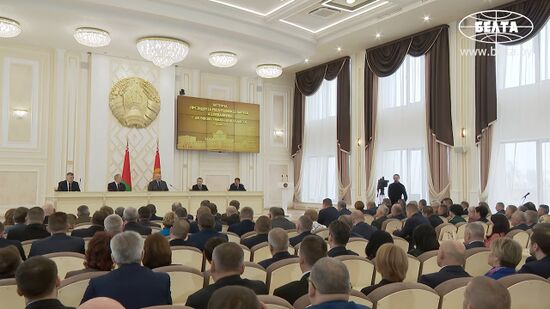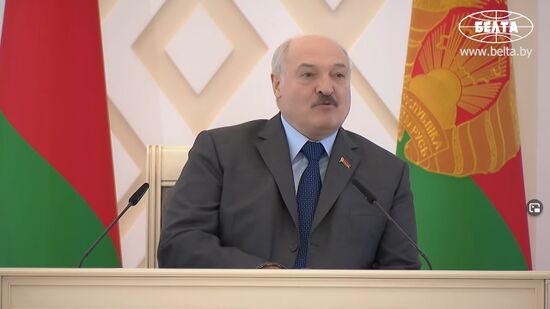Document:Alyaksander Lukashenko on Polish Border Forces and Emil Czeczko
Subjects: Belarus, Poland, Emil Czeczko
Source: BelTA (Link)
Video title: Лукашенко: Отбирали из армии людей, бросали на границу и заставляли убивать! (Lukashenko: People were taken out of the army, thrown to the border and forced to kill!)
Original German subtitle text further below, only the speech of Alyaksander Lukashenko was subtitled for this video, not that of the first speaker.
★ Start a Discussion about this document
Not to go back to what the previous speaker stated, (but) I have to tell you that the facts mentioned are only the visible part of this iceberg.
The situation is much more serious than imagined.
And whoever comes up with a thorough analysis of this situation, within our state and abroad, can see from individual elements - and I'll give you an example right now - what is happening around us.
Let's take the story of the Polish soldier who defected to us.
Did you hear how he talked about, that they, totally drunk, not only killed those poor refugees, but also their own countrymen who were helping the refugees as volunteers.
The soldiers were made drunk and later forced to do so by special people, they were not border guards, as he says.
They simply wore the appropriate uniform and pretended to be Polish border guards.
They were specially trained men belonging to secret services.
Department Defensive, as they used to be called.
The soldiers were forced and coerced. For what purpose?
Because ... let's put it crudely and harshly ... To destroy a person fleeing from war, this fugitive that is, no show with shootings is necessary.
But no!
Made drunk and given the order to shoot:
"Shoot in the head!"
A very dangerous tendency.
People are specifically trained to kill.
Even on him (= the Polish soldier) you could see what it is to kill a human being ...
I don't know, not every military officer present in this room would be able to do it at the first go in such a situation.
Of course, if it's war and you understand that you're going to be killed tomorrow, or that you're going to be killed in combat, or that they're going to shoot your family and so on, then you can understand it completely.
Or if they killed your relatives and you're mentally ready to take revenge for it.
But here ... in a quiet situation ... soldiers were picked out in the army, thrown to the border and forced to kill.
People were purposefully trained to kill.
Do you think that they were trained only for the operations in Poland?
No.
One doesn't want to, but I have to keep that in mind and orient the military to that, that we have to take this factor into account.
Most likely, they trained the soldiers to kill foreign people.
In another state.
In which one?
Let's see... Let them try...
This is only one element, not recognizable at first sight.
But the experts, who scrutinize these events, draw conclusions accordingly.
Um nicht noch einmal darauf zurückzugreifen, was der vorige Redner ausgeführt hat,
muss ich Ihnen sagen, dass die genannten Fakten
nur der sichtbare Teil dieses Eisbergs sind.
Die Situation ist viel ernster als gedacht.
Und wer sich mit einer gründlichen Analyse dieser Situation auseinandersetzt,
innerhalb unseres Staates und im Ausland,
kann an einzelnen Elementen erkennen - und ich führe dazu gleich ein Beispiel an, was um uns herum geschieht.
Nehmen wir mal die Geschichte mit dem polnischen Soldaten, der zu uns übergelaufen war.
Haben Sie gehört, wie er darüber erzählte, dass sie
völlig betrunken nicht nur diese armen Flüchtlinge töteten,
sondern auch die eigenen Landsleute,
die als Volontäre den Geflüchteten geholfen haben.
Die Soldaten wurden betrunken gemacht
und später gezwungen, von speziellen Personen, das waren keine Grenzsoldaten, wie er sagt.
Sie trugen einfach die entsprechende Uniform und gaben sich für polnische Grenzer aus.
Das waren speziell trainierte Männer, die zu Geheimdiensten gehören.
Departement Defensive, wie man sie früher nannte.
Die Soldaten wurden gezwungen und genötigt. Zu welchem Zweck?
Denn ... wollen wir es mal grob und hart formulieren ...
um eine Person zu vernichten, die vor Krieg flieht, diesen Flüchtling also,
ist keine Show mit Erschießungen nötig.
Aber nein!
Abgefüllt und Schießbefehl gegeben:
"In den Kopf schießen!"
Eine sehr gefährliche Tendenz.
Die Menschen werden gezielt trainiert zu töten.
Sogar an ihm (= dem polnischen Soldaten) konnte man sehen, was es ist, einen Menschen zu töten ...
Keine Ahnung, nicht jeder in diesem Saal anwesende Militäroffizier wäre imstande, das auf Anhieb zu tun
in so einer Situation.
Natürlich wenn es Krieg ist und man versteht, dass man morgen getötet wird
oder dass man gleich im Kampf getötet wird
oder dass man deine Familie erschießt und so weiter,
dann kann man das völlig verstehen.
Oder wenn man deine Verwandten getötet hat
und du mental bereit bist, sich dafür zu rächen.
Aber hier ... in einer ruhigen Situation ...
wurden in der Armee Soldaten ausgesucht,
an die Grenze geworfen
und gezwungen zu töten.
Die Menschen wurden zielgerichtet trainiert zu töten.
Glauben Sie, dass sie nur für die Einsätze in Polen trainiert wurden?
Nein.
Das möchte man nicht, aber ich muss mir das merken
und die Militärs darauf orientieren,
dass wir diesem Faktor Rechnung tragen müssen.
Höchstwahrscheinlich haben sie die Soldaten trainiert, fremde Menschen zu töten.
In einem anderen Staat.
In welchem?
Mal sehen... Sollen sie nur versuchen...
Das ist nur ein Element, auf den ersten Blick nicht erkennbar.
Aber die Experten, die diese Geschehnisse genau unter der Lupe nehmen,
ziehen entsprechende Schlussfolgerungen.
Video information text: Лукашенко: Вы заметили – он рассказывал о том, что они по пьяни убивали не только беглых этих бедолаг-мигрантов, но и своих поляков, которые помогали этим беженцам, - волонтеров. Они их спаивали. Потом заставляли специальные люди. Никакие это не пограничники, как он говорит. Просто они были одеты и представлялись, как польские пограничники. Это специальные подготовленные люди в системе спецслужб.
Президент Беларуси Александр Лукашенко на встрече с активом Гомельской области рассказал о некоторых выводах, которые можно сделать из рассказа сбежавшего в Беларусь польского военнослужащего Эмиля Чечко.
(Lukashenko: Did you notice - he said that they drunkenly killed not only these runaway migrant refugees, but also their Poles who helped these refugees - the volunteers. They were getting them drunk. Then they were forced by special people. None of them were border guards, as he says. They were just dressed up and introduced themselves as Polish border guards. These are special trained people in the system of special services.
At a meeting with the activists of Gomel region, President of Belarus Alexander Lukashenko told about some conclusions from the story of Emil Chechko, a Polish soldier, who escaped to Belarus.

